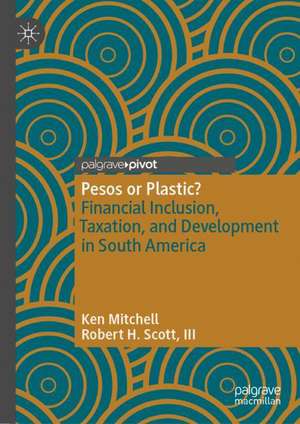Pesos or Plastic?: Financial Inclusion, Taxation, and Development in South America
Autor Ken Mitchell, Robert H. Scott, IIIen Limba Engleză Hardback – 15 apr 2019
Households with a bank account – or, the bank participation rate – began increasing significantly around 2002, and this increase has coincided with an unexpected rise in tax collection (especially value-added taxes (VAT)) spanning periods of macroeconomic growth (2003-2009) and stagnation (2010-2015). Correlation does not imply causation, yet using empirical methods this book shows financial inclusion contributes to better tax collection by encouraging more formal market transactions via the use of bank-provided credit and debit cards. Consumption represents the largest component of most economies and consumption taxes contribute more to public revenue in the southern cone than other taxes, hence more formal consumption enhances overall tax collection.
Preț: 384.48 lei
Nou
Puncte Express: 577
Preț estimativ în valută:
73.59€ • 79.97$ • 61.86£
73.59€ • 79.97$ • 61.86£
Carte tipărită la comandă
Livrare economică 21 aprilie-05 mai
Preluare comenzi: 021 569.72.76
Specificații
ISBN-13: 9783030148751
ISBN-10: 3030148750
Pagini: 79
Ilustrații: XVIII, 90 p. 10 illus., 9 illus. in color.
Dimensiuni: 148 x 210 mm
Greutate: 0.33 kg
Ediția:1st ed. 2019
Editura: Springer International Publishing
Colecția Palgrave Pivot
Locul publicării:Cham, Switzerland
ISBN-10: 3030148750
Pagini: 79
Ilustrații: XVIII, 90 p. 10 illus., 9 illus. in color.
Dimensiuni: 148 x 210 mm
Greutate: 0.33 kg
Ediția:1st ed. 2019
Editura: Springer International Publishing
Colecția Palgrave Pivot
Locul publicării:Cham, Switzerland
Cuprins
Chapter 1. Financial Inclusion and the Middle of the Pyramid, a New Public Revenue Strategy for the 21st Century.- Chapter 2. Public Revenue, Financial Inclusion and Value Added Tax in Argentina.- Chapter 3. Financial Inclusion and Value-Added Taxes in Argentina, Brazil and Chile.
Notă biografică
Ken Mitchell is chair and associate professor in the Department of Political Science and Sociology at Monmouth University, USA. His political economy research on Mexico, Argentina, Brazil, and The Dominican Republic appears in Bulletin of Latin American Research, The Latin Americanist, Oxford Development Studies, Challenge, Monthly Review, and Journal of Post-Keynesian Economics. He is the author of State-Society Relations in Mexico published by Ashgate (2001).
Robert H. Scott, III is professor in the Department of Economics, Finance, and Real Estate at Monmouth University, USA. He teaches Econometrics; Financial Institutions and Risk Management; Macroeconomics and Political Economy. His research publications focus on consumer debt, applied econometrics, financial literacy, small business financing, financial markets and Kenneth Boulding. He is the author of Kenneth Boulding: A Voice Crying in the Wilderness (2015) published by Palgrave Macmillan and included in the Great Thinkers in Economics book series.
Robert H. Scott, III is professor in the Department of Economics, Finance, and Real Estate at Monmouth University, USA. He teaches Econometrics; Financial Institutions and Risk Management; Macroeconomics and Political Economy. His research publications focus on consumer debt, applied econometrics, financial literacy, small business financing, financial markets and Kenneth Boulding. He is the author of Kenneth Boulding: A Voice Crying in the Wilderness (2015) published by Palgrave Macmillan and included in the Great Thinkers in Economics book series.
Textul de pe ultima copertă
The book covers financial inclusion in the southern cone (Argentina, Brazil, and Chile) and its impact on public finance. Possible negative consequences of greater financial inclusion are identified, but the book argues potential benefits outweigh costs. Financial inclusion has many definitions, but in this book, we interpret it as bank account ownership and the use of banking services. Financial inclusion in this context proffers advantages in the area of tax collection, perhaps the southern cone’s gravest economic obstacle given its future debt servicing commitments and its socioeconomic development challenges.
Households with a bank account – or, the bank participation rate – began increasing significantly around 2002, and this increase has coincided with an unexpected rise in tax collection (especially value-added taxes (VAT)) spanning periods of macroeconomic growth (2003-2009) and stagnation (2010-2015). Correlation does not imply causation, yet using empirical methods this book shows financial inclusion contributes to better tax collection by encouraging more formal market transactions via the use of bank-provided credit and debit cards. Consumption represents the largest component of most economies and consumption taxes contribute more to public revenue in the southern cone than other taxes, hence more formal consumption enhances overall tax collection.
Households with a bank account – or, the bank participation rate – began increasing significantly around 2002, and this increase has coincided with an unexpected rise in tax collection (especially value-added taxes (VAT)) spanning periods of macroeconomic growth (2003-2009) and stagnation (2010-2015). Correlation does not imply causation, yet using empirical methods this book shows financial inclusion contributes to better tax collection by encouraging more formal market transactions via the use of bank-provided credit and debit cards. Consumption represents the largest component of most economies and consumption taxes contribute more to public revenue in the southern cone than other taxes, hence more formal consumption enhances overall tax collection.
Caracteristici
Shows financial inclusion contributes to better tax collection by encouraging more formal consumer transactions via the use of bank-provided credit and debit cards Argues that the higher a country’s BPR the greater the economic impact Includes a case study of Argentina focuses on the intersection of financial inclusion and public revenue or taxation Finds that changes in formal banking participation rates and increased credit card and debit card use are correlated with increased VAT revenue
